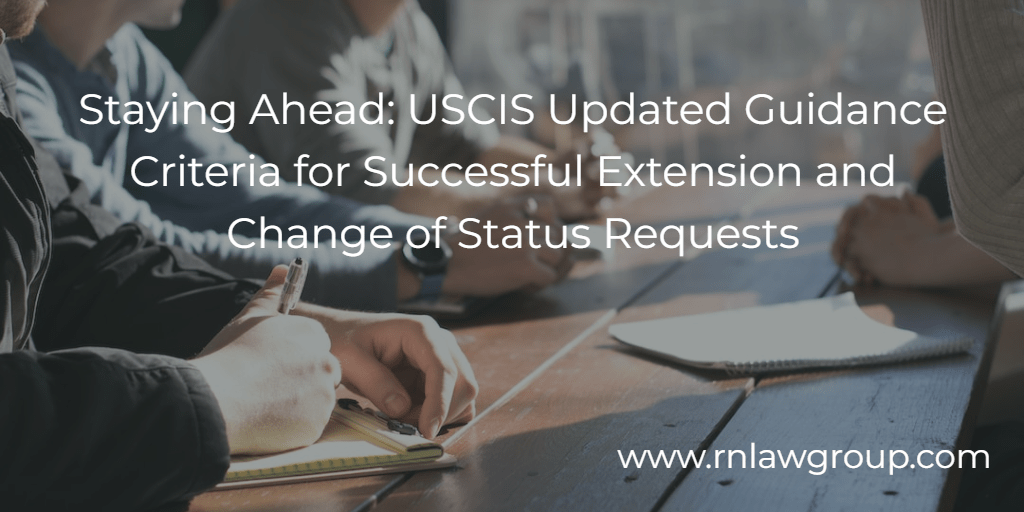
Staying Ahead: USCIS Updated Guidance Criteria for Successful Extension and Change of Status Requests
Embarking on the complex journey of navigating the United States Citizenship and Immigration Services (USCIS) guidelines for nonimmigrant stay extensions can be a daunting task for individuals and petitioners alike. The intricacies surrounding timely filings, extraordinary circumstances, and split decisions in extension requests often leave many in a state of confusion. These intricacies can become even more complex or overwhelming especially when USCIS periodically updates its guidance policies on how the Agency and its officers shall adjudicate requests for extensions of stay while under certain nonimmigrant statutes.
On January 24, 2024, USICS announced updates to its guidance on Form I-129 nonimmigrant petitions and Form I-539 applications that are filed untimely with requesting an extension of stay or a change of status. This update can be found within Part A, Chapter 4, Volume 2 of the USCIS Policy Manual. In this article, we will delve into the critical aspects of extension of stay and change of status requests, providing valuable insights and straightforward solutions to demystify the process, ensuring a smoother experience for those seeking to extend their nonimmigrant stay. Whether you’re a petitioner or an applicant, optimizing USCIS filings is within reach, and we’re here to guide you through it.
When Are Requests for Extension of Stay or Change of Status Typically Required?
H-1B extension petitions are typically required when individuals holding H-1B, H4, or other qualifying temporary nonimmigrant status need to prolong their authorized stay in the United States beyond the initial admission period. This admission period or period of authorized stay is typically going to be governed by the nonimmigrant’s I-94 expiry date. It is very important for timely filing to ensure that all parties (employee, dependent, and employer alike) are aware of the accurate expiry date to consider when determining when the extension of stay should be filed. This extension is necessary to continue engaging in activities permissible under their H-1B classification. Common situations prompting the need for an extension include the expiration of the initial H-1B period or changes in employment terms requiring an updated petition. Understanding the specific scenarios that warrant H-1B extensions is crucial for maintaining lawful status.
USCIS has laid out guidelines for certain nonimmigrants in the country who, for a predetermined temporary period, engage in activities allowed under their specific nonimmigrant classification. These individuals, or their petitioners, have the option to request an extension of their admission period or seek a change of status to another nonimmigrant classification, subject to meeting specific requirements. The request for extension or change of status is typically submitted using either the Petition for a Nonimmigrant Worker (Form I-129) or Application to Extend/Change Nonimmigrant Status (Form I-539), depending on the classification in question.
Timely Filing Requirements and USCIS Discretion: What You Need to Know
When it comes to filing for an extension of stay or change of status, adhering to timely filing requirements is crucial. USCIS generally does not approve requests from individuals who have failed to maintain their previously accorded status or whose status expired before the application or petition filing date. However, USCIS retains the discretion to excuse such failures under certain circumstances when requested within the extension of stay or change of status request. The requester must demonstrate:
- The delay was due to extraordinary circumstances beyond their control;
- The length of the delay aligning with these circumstances;
- The individual has not violated their nonimmigrant status, other than the late filing;
- The individual remains a bona fide nonimmigrant; and
- The individual is not the subject of removal and/or deportation proceedings.
USCIS considers various situations as extraordinary circumstances, such as delays caused by labor disputes or funding lapses affecting adjudications. If USCIS approves an untimely filed application or petition, the approval is effective from the expiration date of the prior nonimmigrant admission period. For late-filed change of status requests, the change takes effect on the approval date. In such cases, USCIS deems the applicant or beneficiary to have maintained lawful status during the excused period. In situations where, USCIS’s discretion was not exercised favorably and the adjudicating officer deems the applicant has not maintained status, they may still offer a consular approval notice (I-797B) which will require the applicant to obtain travel and obtain stamping if their nonimmigrant visa stamp has expired.
Extension of Petition Validity: Significance and Considerations
Deference to Previous Approvals:
When requesting an extension of petition validity, often submitted with an extension of stay request, individuals rely on previous findings of eligibility for their classification. While USCIS, U.S. Customs and Border Protection (CBP), and the U.S. Department of State (DOS) make these determinations, the burden of proof for extension of petition validity rests on the petitioner. USCIS officers are not bound to approve subsequent petitions based solely on prior approvals, as each case is decided on a case-by-case basis.
Deviating from Previous Approvals:
USCIS requires careful consideration when deviating from previous approvals. Officers should not defer to prior approvals in cases involving (1) material errors, (2) material changes in circumstances or eligibility requirements, or (3) new adverse material information. The adjudicating USCIS officer’s determination of deference to the previous approved petition not being appropriate must acknowledge prior approvals in any issued case denial notices, Requests for Evidence (RFE), or Notices of Intent to Deny (NOID). The adjudicating officer is also required by this policy guidance to provide a clear an articulate explanation of the reasons for not deferring to a previous approved petition or application. Supervisory approval is necessary before deviating from a prior approval in the final decision and USCIS officers must provide the petitioner or applicant an opportunity to respond to the new information.
The updated USICS guidance also elaborates on when the adjudicating officer should not defer to a prior approval. For instance, an adjudicating officer should not apply deference to a previous approval when there is new material information at their disposal. This could encompass publicly accessible data that impacts eligibility for immigration benefits. For instance, the officer might become aware that a petitioner has recently closed their business. Additionally, information affecting national security or public safety obtained from security checks on beneficiaries and petitioners is considered in this context. If there are signs indicating potential fraud or deliberate misrepresentation of essential information, the officer is directed not to defer to a prior approval. Regardless if deference is used or not, if an RFE or NOID is issued upon review of the petition or application, the USCIS adjudicating officer is required to clearly outline the new material information in a Request for Evidence (RFE) or Notice of Intent to Deny (NOID) documents.
Cases Involving Other Agencies:
USCIS officers consider but do not defer to previous eligibility determinations made by CBP or DOS. Determinations are based on the petition filed with USCIS and the corresponding evidence on record.
Split Decisions in Extension Requests: A Closer Look
In certain situations, officers may deny an applicant or petitioner’s request to extend a nonimmigrant’s stay in the same classification, even if eligibility is demonstrated. This “split” decision process may lead to the approval of the petition for the same classification where the petitioner and beneficiary relationship remains unchanged, while simultaneously denying the extension of stay request. Factors such as inadmissibility or failure to maintain status can contribute to such split decisions.
In conclusion, understanding the intricacies of USCIS guidelines for nonimmigrant stay extensions and petition validity is essential for individuals and petitioners navigating these processes. Timely filing, adherence to requirements, and awareness of USCIS discretion are crucial elements in ensuring a smooth and successful extension experience. Additionally, recognizing the significance of previous approvals, potential deviations, and split decisions provides valuable insights for those involved in the immigration process. These details can be a bit daunting at times, so it is recommended that you seek legal advice from a qualified business immigration attorney to assist you in this process when needing to request an extension of stay or change of status.
Reddy & Neumann has been serving the business community for over 20 years and is Houston’s largest immigration law firm focused solely on U.S. Employment-based immigration. We work with both employers and their employees, helping them navigate the immigration process quickly and cost-effectively.
By : Jeanetly Garcia
Jeanetly Garcia advises employers and individuals through all phases of the non-immigrant visa process. As an attorney in the H-1B Department at Reddy Neumann Brown PC she is experienced in filing nonimmigrant petitions and applications for immigrant benefits, as well as, responding to USCIS issued requests for evidence concerning an array of legal issues.

